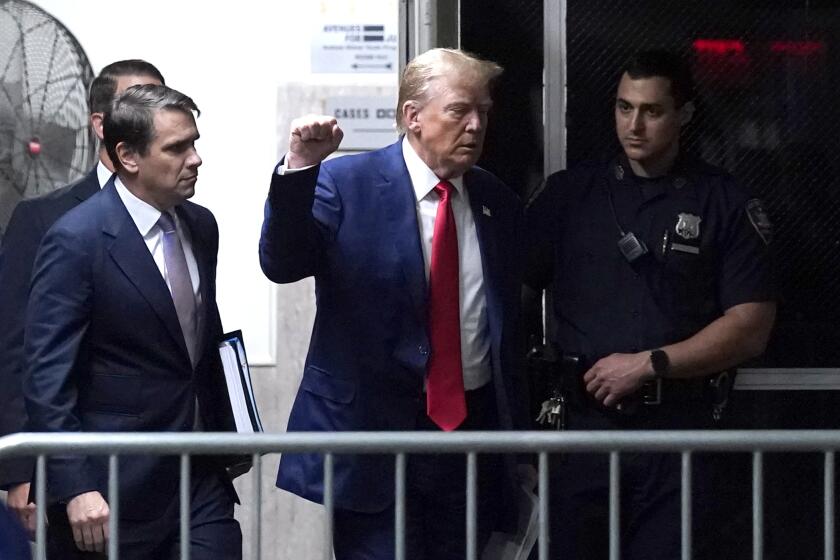More Public Officials Face Indictment in Sting
Encouraged by their successful prosecution of Sen. Joseph B. Montoya, the U.S. attorney’s office is preparing to move ahead with cases against other elected officials, including some who have not yet been publicly identified in a widening probe of Capitol corruption, according to sources familiar with the investigation.
These sources said that additional indictments could come “very shortly,” and that the investigation has broadened beyond Montoya and five other elected officials who have frequently been named in connection with an elaborate FBI sting operation.
After Montoya’s conviction on seven counts of racketeering, extortion and money laundering Friday, U.S. Atty. David F. Levi refused to discuss who might be the next target for indictment or the timing of future prosecutions.
However, other sources familiar with the investigation say the government prosecutors were preparing a case against State Board of Equalization member Paul Carpenter even before the Montoya case went to trial.
The sources said that in early December, Carpenter, accompanied by an attorney, met with Levi to discuss Carpenter’s actions in 1986 when he accepted $20,000 in campaign contributions from FBI agents masquerading as businessmen as part of the sting.
At the time of the payments, Carpenter, then a state senator, was campaigning for his seat on the state tax board.
The Democratic politician, who has said he did nothing illegal in accepting the contributions, could not be reached for comment Friday. But a spokesman for Carpenter, Jerry Goldberg, said: “Carpenter has steadfastly maintained he has done nothing wrong. Any contribution was made under the laws of California and deposited in campaign accounts and used for campaign purposes in accordance with those laws.”
Sources said Carpenter contends he “smelled something fishy” when his aide, John Shahabian, came to him with an offer of $20,000 in contributions from “Southern businessmen” seeking support for a special-interest bill that would supposedly help them start up a shrimp processing plant near Sacramento.
Nevertheless, Carpenter took the money and then later avoided voting on the shrimp bill when it came up on the Senate floor.
Later, Shahabian, who became an informant for the prosecution, secretly tape recorded his conversations with legislators.
Levi would not comment on the investigation of Carpenter. But in an interview after the Montoya verdict, he emphasized that a politician need not deliver on a promise to be convicted under federal extortion law.
“You cannot have people running around, letting people think they can be influenced by a bribe, take a bribe and say (to law enforcement authorities) ‘you can’t do anything about it,’ ” Levi said.
The federal prosecutor indicated that Montoya’s conviction is just a beginning.
“I’m certain there will be a burst of activity in the coming months as we turn back from the trial to other matters,” Levi told a Times reporter.
He noted that his office recently added a fourth attorney to the prosecution team, veteran Prosecutor George O’Connell who is returning to the U.S. attorney’s office here after working as a defense attorney in Los Angeles. O’Connell and Levi worked closely in launching the sting operation.
On Friday, sources familiar with the probe said prosecutors are pursuing leads about so-far unnamed legislators who are also suspected of using their offices for personal gain. The sources refused to identify the new targets of the probe.
The testimony in the Montoya trial revealed key elements of the cases that federal prosecutors are preparing against ex-Sen. Carpenter and four other legislators.
Evidence introduced in court showed that federal undercover operatives delivered at least $39,500 to Carpenter and three other lawmakers and engaged them in conversations about the money that undoubtedly were tape recorded.
In addition, the statements of Sen. Alan Robbins (D-Tarzana), in one tape-recorded conversation played to jurors, show that he steered a federal informant to Montoya and suggested the Whittier Democrat’s vote could be purchased for $3,000 in “a little envelope.”
Robbins could not be reached for comment Friday. He has repeatedly defended himself by citing the fact that he refused payments from undercover operatives seeking support for the shrimp bill.
In addition to Robbins and Carpenter, Assemblywoman Gwen Moore (D-Los Angeles), Assemblyman Frank Hill (R-Whittier) and Assemblyman Pat Nolan (R-Glendale) all were involved in the same undercover sting operation that snared Montoya. All five have said they did nothing wrong.
These are some of the key pieces of evidence that emerged from the Montoya trial:
The case against Robbins was strengthened by the testimony of Montoya himself, who told the jury that Robbins once solicited a bribe. Montoya said Robbins refused to vote on a bill affecting osteopathic physicians unless he received a campaign contribution from them. Robbins has denied ever asking Montoya to help raise campaign money for him.
Carpenter personally accepted a $5,000 campaign contribution in 1986 from undercover agent Jack Brennan, who was using the name Jack Gordon. Carpenter, who received a total of $20,000 in contributions, also worked behind the scenes on behalf of a bill to benefit the shrimp “company,” Shahabian testified.
Moore, called as a witness for Montoya, said she returned a $5,000 contribution in 1986 after Brennan approached her and asked if the amount “was enough.” But two years later, she kept a $2,000 contribution from other undercover operatives who attended one of her Capitol fund-raisers.
Hill agreed to become a co-author of the 1988 bill pushed by undercover agents and arranged to receive an honorarium at a breakfast meeting similar to the videotaped session where Montoya received a $3,000 payment. Hill later reported receiving a $2,500 honorarium from a dummy company set up by the FBI.
Nolan, who was then the Assembly Republican Leader, was arranging with Shahabian to receive campaign contributions in 1988. Nolan later reported receiving $10,000 in contributions from the shrimp “company.”
Also contributing to this story were Times staff writers Ronald J. Ostrow in Washington and Virginia Ellis in Sacramento.
THE MONTOYA VERDICTS
COUNTS CRIME CHARGE VERDICT 1. Racketeering Engaged in pattern of bribery Guilty and extortion on eight separate occasions 2. Extortion Received $3,000 from Guilty undercover FBI agent seeking legislative help 3. Bribery Based on Count 2 Dismissed earlier 4. Money Deposited the $3,000 from the Guilty laundering FBI agent into a personal account 5. Extortion Sought money from actor Ed Not guilty Asner, representing Screen Actors Guild 6. Extortion Sought money from lobbyists Guilty for foreign medical schools 7. Extortion Sought money and free travel Guilty from a Florida executive selling insurance for high school athletes 8. Extortion Sought money from the NFL Guilty Players Assn. 9. Extortion Sought money from sports Guilty agent Michael Trope 10. Extortion Sought money from the Allan Not guilty Co. recycling firm 11. Extortion Sought money from the Not guilty California Independent Petroleum Assn. 12. Bribery Based on Count 11 Dismissed earlier
More to Read
Get the L.A. Times Politics newsletter
Deeply reported insights into legislation, politics and policy from Sacramento, Washington and beyond. In your inbox three times per week.
You may occasionally receive promotional content from the Los Angeles Times.






